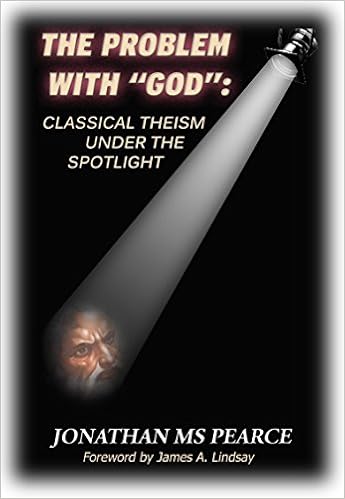Fans de Waal is a crucial figure in the research into morality, fairness, reciprocal altruism and suchlike within the realm…
Here I want to discuss a few books published recently and which I have read in the last few months that are focused on math. They are not books on how to do math (i.e., textbooks), but instead they discuss mathematical concepts and their relations to ways of thinking about the world. Sometimes they touch on theological issues, sometimes a lot. But all three are good reads.
The Heartland Institute, a prominent, Chicago-based organization opposing climate science, has teamed up with the creationist Discovery Institute to launch a smear campaign against a group promoting the nationwide adoption of updated science education guidelines.
I love this quote from Valerie Tarico in her chapter “God’s Emotions” in John Loftus’ book The End of Christianity.
To say that the descriptions of God in the Bible are metaphors does not make the situation any better. A metaphor about something as deep as the human relationship to ultimate reality needs to be deeply accurate.
YES!!! GIVE IS OUT, GOVE IS OUT, WHOOP DE DOO, GOVE IS OUT. GOVE HAS GONE, GOVE HAS GONE, YAY YAY YAY, GOVE HAS GONE!
Some of the writers here at SIN have contributed to an anthology called 13 Reasons to Doubt, with chapters ranging over many aspects of skepticism. Here s the description:
Extraordinary claims and extraordinary evidence.
Modern day Christians hold that Jesus and God are one. The Athanasian Creed for instance holds that “…there is one Person of the Father; another of the Son; and another of the Holy Ghost.
Metaphysical thought processes are more deeply wired than hitherto suspected
WHILE MILITANT ATHEISTS like Richard Dawkins may be convinced God doesn’t exist, God, if he is around, may be amused to find that atheists might not exist.
Cognitive scientists are becoming increasingly aware that a metaphysical outlook may be so deeply ingrained in human thought processes that it cannot be expunged.
Pope Francis has been quoted as saying that reliable data indicates that “about 2%” of clergy in the Catholic Church are paedophiles.
The Pope said that abuse of children was like “leprosy” infecting the Church, according to the Italian La Repubblica newspaper.
Good ole Brian Cox. I miss his wistful stares from mountaintops as he regales the audience with soundbites of majestic physics.
The TV presenter/scientist/ex-keyboardist of D-REAM has recently come to Twitter blows with blowhard Chopra and his rather dubious use of real science to espouse his spiritualistic nonsense. There is a great article, here, at The New Statesman:
Over at another post of mine, we have been discussing whether religion can and should be destroyed. During that conversation, the idea came up that Christians, in all probability, hold more ridiculous beliefs which are unscientific in nature; and also arose the connected idea that Christians, in a generalistic sense, are not as good at doing science, because they have a higher propensity to give up searching for answers.
If you haven’t seen this, genius. This shit actually happens. Love the priest who ACTUALLY attacks that woman. Mental.
I am speaking at Bournemouth tonight, on free will. It is at the Bournemouth Skeptics in the Pub. Be there!…
I, as you may well know, contribute to the Skepticule podcast by recording a counter-apologetics segment for them, Pearced Off.…
Epic Rap Battle! Awesome sauce (H/T Void]
If you, like me, have been really pleased that the state of comedy and satirical news is in rude health, and if you have been comforted by the emergence of John Oliver and his research- and fact-based show (Last Week Tonight) , then you will find this a good read. I have loved John Oliver’s comedy. The writing is astute, and chimes with so much of what is going on in the liberal, secular, intellectually invigorated community.
This is an issue that plagues every single media institution. Because the BBC is THE port of call, for me at least, for news and views, whether from their excellent website, r from their news coverage, it is infuriating, from a skeptical point of view, that equal airtime is given to dissenting views which do not hold equal proportion of adherence in the relevant fields. That a creationist might receive 1 on 1 battle time with an evolutionary bioligist is misrepresenting the state of affairs, as can be seen here:
In debating whether religion is a cause of or an excuse for violence, moral wrongdoing and problems in the world (in a discussion on facebook), it is worth noting that:
The failure to tackle female genital mutilation (FGM) is a “national scandal” with as many as 170,000 victims in the UK, MPs have said.
Failures by ministers, police and other agencies have led to the “preventable mutilation of thousands of girls”, the Home Affairs Committee said.
The National Governors’ Association calls for the abolition of the 70-year-old rule that requires schools to hold a Christian assembly every day, saying it is “meaningless”
I was involved in a little discussion over at Advocatus Atheist the some time ago with regard to whether a secular and skeptical approach can spell the end of religion. I found this to be interesting. Even if the evidence (does it not already) overwhelmingly ruled in favour of the disbelief in a personal god, would religion still tenuously hang on to the threads of desperate hope or ritualistic comforts that humanity seems to endure?



